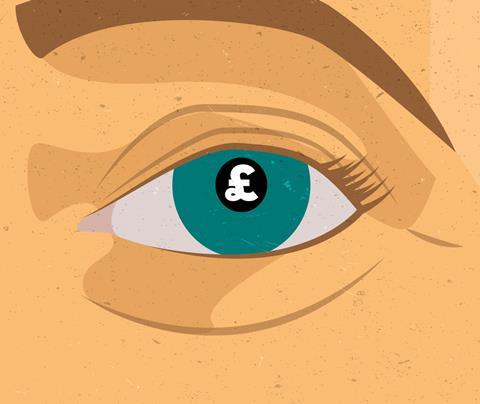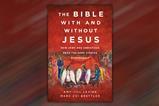Lois Tverberg unlocks a Jewish idiom that Jesus used, but many of his followers have scratched their heads about

While Americans understand what it means to ‘kick the bucket’, they are largely mystified when Brits say that someone ‘popped his clogs’. If you’ll forgive the use of yet another idiom, we know that some things get lost when ‘crossing the pond’.
These strange turns of phrase are not unique to English. All languages have phrases that mean something than what the words say literally. In order to unlock their meaning, you need to have an awareness of not just the language, but the wider culture from which they came.
Idioms in the Bible have presented quite a challenge for translators. But understanding Jesus’ Jewish context have provided clues that have unlocked some of his most difficult sayings.
Head-scratchers
We find a particularly difficult teaching in Matthew 6:22-23: “The eye is the lamp of the body. If your eyes are healthy, your whole body will be full of light. But if your eyes are unhealthy, your whole body will be full of darkness. If then the light within you is darkness, how great is that darkness!”
What on earth was Jesus talking about? This strange saying has provoked a multitude of interpretations. You’ve likely heard at least one sermon about keeping your eyes fixed on Christ. While this classic interpretation sounds reasonable, others see Jesus preaching Eastern mysticism and interpret the ‘eye’ as about seeking inner enlightenment. At least one pastor has concluded that we should simply appreciate our ability to see! Rather than relying on pious guesswork, it’s more helpful to become aware of Jesus’ Hebraic ‘accent’. The real meaning of this passage is not at all obvious otherwise.
The Greek contains clues that the wording is translating two Hebrew idioms that can be found elsewhere in the Bible. Take a look first at “if your eyes are unhealthy”. Literally the Greek reads: “if your eye is bad/evil”. Here we encounter a well-known Jewish idiom, to have a ‘bad eye’. It means to be selfish and stingy, unwilling to help those in need. In Deuteronomy 15:9, God warns the Israelites to “not show ill will towards the needy”. The literal wording is that you should not have a “bad eye towards your poor brother” so that you begrudge him help and give him nothing.
We find Jesus using this same phrase at the end of his parable about the vineyard owner in Matthew 20:1-16. After hiring workers all day long to help in his fields, the generous farmer pays them all equally at the end. When the ones who began earliest start to complain, the vineyard owner confronts them by saying: “Is your eye [bad/]evil because I am good?” (v15, NKJV, my italics). He actually means: “Are you being selfish/greedy because I am generous?”
HOW IT FITS TOGETHER
Most likely Jesus was contrasting having a ‘good eye’ with having a ‘bad eye’. We find this second Hebrew idiom about the eye in Proverbs 22:9: “Whoever has a bountiful/[good] eye will be blessed, for he shares his bread with the poor” (ESV, my italics). Generosity is clearly the emphasis here.
You can find idioms about the ‘good eye’ and ‘bad eye’ elsewhere in the Bible and in Jewish writings. In fact, these idioms are still used by Hebrew speakers today. Why haven’t translators understood Matthew 6:22 using these idioms?
It may be because of a wrinkle in the Greek wording of the text. Matthew doesn’t actually use the Greek word kalos (good) to describe one’s eye, but haplous. In Greek, haplous (single) is the opposite of diplous (double), and often used to describe one’s motivation. A person with a single motive is sincere, while a person with a double motive says one thing while secretly thinking another. The word haplous often means ‘sincere’, ‘pure’ or ‘wholehearted’. But in the New Testament, the meaning of haplous had broadened and was used idiomatically to mean generous as well. We find this in several places, like when Paul reassures his supporters that God will enrich them in every way so that they “can be generous [haplous] on every occasion” (2 Corinthians 9:11, my italics).
Your ‘eye’ towards helping others is one of the truest measures of your faith in God
What is going on in Matthew 6:22? It’s likely that Matthew realised that Jewish idioms about having a ‘good eye’ or a ‘bad eye’ would not make sense to Greek speakers any more than they do to us in English. So Matthew was explaining a Hebrew idiom by rendering it with Greek wording that has an idiomatic meaning of ‘generous’, thereby exchanging one turn of a phrase for another.
If you read Jesus’ words about the ‘eye’ in Matthew 6 without a knowledge of the idioms he was using, Matthew 6 feels like a random collection of unrelated sayings. But look at how these lines fit into the surrounding passages. Immediately before the ‘eye’ passage Jesus proclaims that “where your treasure is, there your heart will be also” (v19-21). Immediately afterwards he preaches: “No one can serve two masters. Either you will hate the one and love the other, or you will be devoted to the one and despise the other. You cannot serve both God and money” (v24). When you understand this mysterious saying about the ‘eye’, you find that it is actually part of a longer sermon about the importance of our attitude towards money.
WHY IT MATTERS
If you think about it, your ‘eye’ towards helping others is one of the truest measures of your faith in God. If you cling tightly to every penny, it shows that you’re convinced that you’re all alone in facing the world. Clearly, you’ve decided that God does not watch over you. What a dark and terrifying place to live in!
In contrast, you could instead say to yourself: “I know that funds are tight right now and not all of my needs are being met. But ultimately, my life is secure because I am under God’s loving care.” Then your hands will easily reach out to help others. That’s when your life starts to shine brilliantly with the love of Christ


































